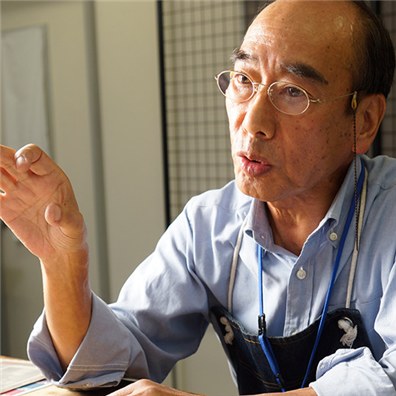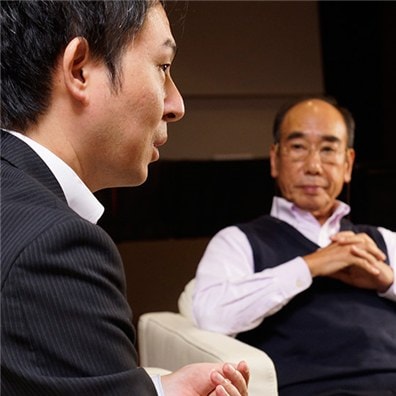Part 1: Mathieu Dufour meets Yamaha handmade flute.
Yamaha Flute "Artist meets Yamaha Artisan"
Mathieu Dufour × Keisuke Tanaka
Dufour - The tone isn't created by the instrument, but by the mind of the player. A great instrument will effectively and subtly respond to the player's mind.
― Mr. Tanaka of Yamaha plays a very important role for you. First, I'd like to ask you about your relationship with Mr. Tanaka. How did the two of you meet?
DUFOUR - The first time I met Mr. Tanaka was when I was with The Chicago Symphony Orchestra and Mr. Tanaka was working at Yamaha in Grand Rapids, Michigan. I think it was in 2005 or 2006? It's been a long time (laughs).
TANAKA - It was 2006. One of my colleagues was going to meet with a trumpet player, who plays Yamaha, in The Chicago Symphony Orchestra so I went along with him. That was when I had the opportunity to meet Mr. Dufour as I had wanted to meet him for some time, so I gave him my business card and introduced myself.
As you might already know, the flute manufacturers in Boston have a significant presence in the United States, and Yamaha is a competitor who challenge to their market dominance. I always want performers to try our instruments, so when I asked him if he wanted to try one of ours he readily agreed. It was a four-hour drive from Grand Rapids to Chicago.
DUFOUR - Keisuke has a bright and cheery personality and wasn't pushy at all. He soon came to the Chicago Orchestra's hall and to my apartment to have me try out a variety of his flute models. This was the first time since I was a student that I played a Yamaha flute but I always like to try out a new flute. That was when I had an opportunity to try a wonderful gold flute... When was that?
TANAKA - This was in 2008 when the handmade flute model, 900/800 Series, was first revealed. Mr. Dufour was very pleased with 900/800 Series and from there we started the process of adjusting the instrument to meet the precise needs of Mr. Dufour. I remember that Mr. Dufour played a gold flute but said he liked the sound of a silver flute more. It made me feel great when he said to me, "We don't have any great technicians in Chicago. Would you like to come live here?"
DUFOUR - However, things didn't work out.
TANAKA - After that, I returned to our main office in Japan and I handed over the role to the staff in the United States to take care of Mr. Dufour. However, everyone at Yamaha works as a team and our relationship with Mr. Dufour in Japan still continued to grow and blossom to this day.

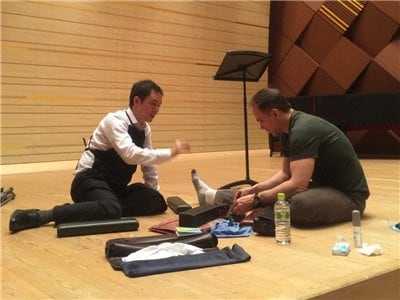
"I fell in love with my own tone."
― What was your first impression when you played 900/800 Series for the first time?
DUFOUR - Mechanically it was very sound and I felt it was an extremely reliable instrument. Its sound was soft with a wide range of tone. I was most amazed at its pitch. There was almost no variance in the pitch registers and this made it easier to combine with other instruments.
Afterward, when we were getting close to finally completing my flute with all of the small adjustments I had requested, I remember playing it in the symphony hall for the first time. I adored the sound I was making and fell in love with my own tone.
I feel exactly the same way about my flute now as I did then.
TANAKA - When I first received words of Mr. Dufour's comments and assessment, I thought, "We did it!"
The 900/800 Series model had never existed in Yamaha's lineup before. We worked together with Mr. Andras Adorjan to develop the model, and the most significant point when developing it was to expand the instrument's capacity so that it would not only be best for Mr. Adorjan but be selected by all types of flute players. That is why it meant so much to us and was encouraging when we heard Mr. Dufour appreciated the flute before it went on sale.
DUFOUR - My first impression was that there had never been an instrument so well attuned to my own playing. Even if I find an instrument I like, I always have an issue with something that I can't get out of my mind.
TANAKA - Up until that point, I had frequently heard that Yamaha was fine as a second choice, but a little lacking to be the first choice by flutists. When you try to make an instrument that sounds like a flute for everyone, it inevitably comes out as an average instrument. It was our idea to break through this limitation by making it easier to blow into or slightly heavier to give it a little resistance. We worked on 900/800 Series with Mr. Adorjan, sometimes almost arguing along the way, as we hammered out the exact specifications for 900/800 Series.
― Mr. Dufour, in a past interview (issue no. 383, July 2013) you talked about Yamaha instruments being good because they are "moderation".
DUFOUR - When the term "moderation" was used before, it had a negative connotation and it meant that the instrument lacked character. However, since then there have been remarkable advances in manufacturing techniques and now it is possible to create instruments with individual characteristics that do not diminish what a player has to offer. Today, to me, this phrase means an instrument that can be used by any player to find their own sound and that it is a truly superior instrument that embodies the real meaning of "moderation".
TANAKA - That is wide moderation to open up the realm of possibilities and imagination of the flutist rather than narrow moderation keeping it tight and constrained.
DUFOUR - There are some instruments that will force one color or tone, regardless of whether the flutist likes or dislikes it. It is difficult to alter the texture of sound made by such instruments. The tone isn't created by the instrument, but by the mind of the player. A great instrument will effectively and subtly respond to the player's mind.
A silver offset model 900/800 Series was proposed to me...
― You currently use a 14K gold 900/800 Series, but the other day you were using a silver 900/800 Series at your recitals in Tokyo and Osaka (July 27 at Yamaha Hall and July 29 at the Abeno Ward Community Center in Osaka).

DUFOUR - I don't have any particular preference for a certain type of material at all. There was a slight issue with my current flute so Keisuke proposed a silver 900/800 Series to me and it happened to be great as well. It was a great instrument with a wonderful bright and soft tone.
Many people feel attracted to gold flutes probably because they are gold. They might have a significant impact mentally because they are expensive and gorgeous. When you start playing with a silver flute, you always have dreams of playing a gold flute one day. When that dream becomes a reality, you are enamored by the brilliant material, rather than the quality of the instrument itself. It's the same concept with necklaces and why gold necklaces look better than silver ones. There are of course differences in the sound quality of both instruments. A gold flute will have a more substantial and heavier sound while a silver flute will have a brighter and softer tone.
TANAKA - For example, if Mr. Dufour wants a slightly more solid three-dimensional sound, then he doesn't need to think about different materials himself. It is my job to think about those things and in this case I would suggest that he try using a silver instrument. It is through such situations that we are able to gain new insights and knowledge. I believe we are able to provide choices such as this in harmony with the artist because of our long relationship over many years.
― At the recitals, I noticed you used an offset 900/800 Series.
DUFOUR - That was the first time I had used an offset flute in my life. This was also suggested to me by Keisuke.
In my 35 year history of playing a flute, all of them that I had played were inline flutes. However, to be honest, I can't deny the fact that my left hand always felt a little uncomfortable. The shape and size of each person's hands are a little different and in my case I have a large palm but shorter fingers. Because of this, I have to hold an inline flute with my hand slightly bent and this creates a slight amount of tension in my hand. Keisuke was also the one to recommend placing cork on the left index finger key.
TANAKA - There are things we can and cannot do when customizing Mr. Dufour's flute. We can't extend the key so I recommended the cork.
Trouble 5 minutes before performance begins
― From a technician's point of view, what type of client is Mr. Dufour?
TANAKA - Mr. Dufour is someone who specifically and clearly expresses his request without making you try to assume what he wants. However, the level of his request is unspeakably high and solving issues is never an easy matter.
DUFOUR - I think I am someone who focuses on small details and it is always in the realm of subtleties, for better or worse. If there is even just a small leak from a key, instantly I feel it has an effect on my freedom of expression. I'm not a technician so I don't know the cause of the problem.
Yesterday, right before the recital in Osaka I had a problem. It was an extremely hot and humid day and the air conditioning was working almost too much. After the sound check I felt there was some kind of issue with one of the keys so I asked Keisuke about it. He loosened one of the key rods only a little and it temporarily solved the problem. However, I then felt like I had lost a subtle amount of sound.
TANAKA - When I loosened the key rod to adjust the pad, it had the effect of making the quality of sound somewhat tighter. We were faced with the problem of selecting one or the other. This was five minutes before the start of the recital. It was cool inside the hall yesterday although the humidity was high, causing water to drip from the instrument and Mr. Dufour jokingly said that it was like tsunami.
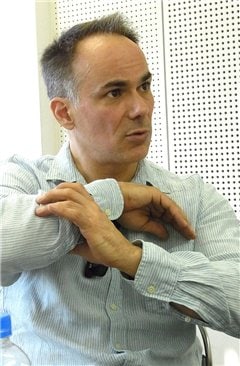
DUFOUR - Flutes despise air conditioning. There is a particular difference in the humidity and temperature inside the hall versus outside in Japan and this can easily damage instruments. Keisuke is always nearby to help with any problems I may have when I play in Japan. Do you think Yamaha could create a miniature clone of him? (laughs) If that was possible, I could play anywhere in the world with peace of mind knowing he was by my side.
Temperature fluctuations with the winter cold are the archenemy of flutes. The lower the temperature is, the cooler the foot joint becomes, which causes the lower tones to be flat and the higher tones to be sharp because the head joint is warmed by your breath. It is difficult to constantly make adjustments while playing.
A surprising event at the Berlin Philharmonic
― Last year you switched from The Chicago Symphony Orchestra to the Berlin Philharmonic. Has the performance environment changed significantly?
DUFOUR - Both are great orchestras but I fell in love with the Berlin Philharmonic when I was a child and it was an old dream of mine to play in it.
One of the things I noticed after joining the Berlin Philharmonic was the vast wealth of ideas of each member, their brilliant sound and their extremely flexible play style. No matter which pult you look at, each member of the strings is a virtuoso in their own right. My flutist colleague, Emmanuel Pahud, is a renowned soloist who needs no introduction and people such as him make up this orchestra. None the less, everyone is serious in their devotion to the music in the orchestra when they play together. That was what I was impressed the most.
― Are you able to play more with your own initiative than before?
DUFOUR - Yes. Put another way, the Berlin Philharmonic is like a large chamber orchestra. There are actually a number of chamber orchestra groups within the orchestra and they are active on the global stage. Whoever comes to be the conductor, the first thing we do is listening to each other play, then we look at the conductor. If there is a time when we aren't playing well together, we first look at ourselves to fix the problem and always talk amongst ourselves to come to a conclusion. That's why those in the Berlin Philharmonic do not complain often to the conductor like other orchestras out there.
― Do you think your sense of sound has changed?
DUFOUR - First, the sound in the hall is different. Also, the sound of oboes sitting next to you in the United States and Europe is different. It's safe to say that the spirit of challenge continues on at the Berlin Philharmonic still now as I was at the wonderful Chicago Symphony Orchestra for a long time. However, it is a fun and exciting challenge.
With that said, I don't spend my time idly by at the Berlin Philharmonic. Here I am always encouraged to be creative with my performance. At first I was a little hesitant to put myself out there so strongly, but those around me encouraged me to bring out everything I have to offer. In other words, they brought me on board because they expected my individual characteristics to bring a fresh perspective to the orchestra. I was most surprised by this attitude.
For example, there are two head oboe players; one is German (Albrecht Mayer) and the other is English (Jonathan Kelly). Both of them sound and play differently. However, even if their methods are different, their destinations are always the same. Both of them don't try to lead me to a certain way of playing, but lead me by playing together. The Berlin Philharmonic doesn't try to integrate into one sound, but tries to play together to create one piece of music and it doesn't matter the road as long as the destination is the same. This is how we are constantly trying to create our own new music and traditions.
TANAKA - That is an impressive story. It reminds me that I am a tool following you around to enhance your performance as you go headfirst into the future. We are determined to provide instruments that meet the desires of artists as they forge ahead and we will continue to make it possible for them. Communication between both sides will be even more vital in the future.
DUFOUR - I believe playing music means to continually evolve as a musician. Musician's play will continue to change as long as the person is human and a musician. This is why I have changed instruments a number of times over the years. My thoughts about sound have continued to evolve and I have never been fully satisfied.
However, I don't feel the need to switch instruments since getting my hands on Yamaha's 900/800 Series. The reason is because of the degree of freedom it provides. It's not about how you are instructed to play, but being able to play the instrument as you intend. I have ideas I am trying to reach and my instrument is what helps me get there. Of course each 900/800 Series has its own personality and I think their major attribute is flexibility. When I am a judge for competitions, there are many times when I can discern the manufacturer of their flute by the plays of the musicians, but it is difficult to tell with Yamaha flutes. I think that is one of the superior qualities of Yamaha flutes.
TANAKA - When you use a Yamaha flute, we want to listen to what you sound like and not what Yamaha sounds like. That is our main hope when creating each instrument. Our role is to provide you with a vessel to fully exhibit your individual characteristics as a performer to your heart and mind's content.

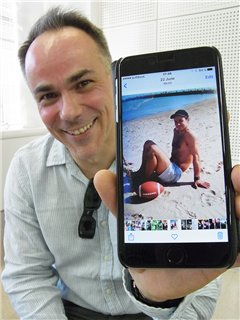
*This article is originally published in a Japanese monthly magazine "PIPERS" from October to December 2016 and includes contents at the time of the interview.
Mathieu Dufour
Paris-born Mathieu Dufour has played the flute since he was eight years old. He initially studied under Madeleine Chassang, then later under Maxence Larrieu at the Conservatoire National Supérieur Musique de Lyon. He has won numerous competitions, including the Concours de flûte Jean-Pierre Rampal. His professional career began in 1993 as principal flute with the Orchestre National du Capitole de Toulouse. In 1996, he moved to the Orchestre de l'Opéra National de Paris where held the same position. Daniel Barenboim then engaged him as principal flute with the Chicago Symphony Orchestra in 1999.
In addition to his orchestral work, he has often performed as a soloist under the baton of Daniel Barenboim, Pierre Boulez, Christoph Eschenbach, and Fabio Luisi, among others. Furthermore, as a chamber musician, he works together with Mitsuko Uchida, Pinchas Zukerman, the Kalichstein-Laredo-Robinson Trio and Julia Fischer. In May 2014, Mathieu Dufour won the audition for the post of principal flute with the Berliner Philharmoniker.
Keisuke Tanaka
Manager for Flute, Piccolo, in Yamaha Corporation Woodwind Design Team. Mr. Tanaka has supported flutists from all over the world.


